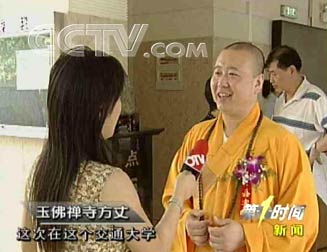Buddhism, a major religion in China, can play a unique role in promoting a
"harmonious society" and contributing to world peace, a top religious affairs
official and researchers said yesterday.

The abbot Chang Chun who's in
charge of Shanghai's thriving Jade Buddha Temple is interviewed as he
enrolled in the MBA class by Shanghai's Jiaotong University.
[cctv] |
As a religion with "profound ideas of harmony and a conception of peace,"
Buddhism can relieve strain and stress among people and between humans and
nature, thus enhancing social accord, said Ye Xiaowen, chief of the State
Administration for Religious Affairs.
China has been striving to build a harmonious society and advocating the
construction of a harmonious world.
Advocating the Buddhist spirit of harmony, peace and benevolence will
undoubtedly push forward harmony in China and the world, Xinhua quoted Ye as
saying.
"As a responsible country, China has had its own deep thinking and measures
of foresight for the promotion of world harmony," Ye said.
"Religious force is one of the important social forces from which China draws
strength."
The official made the remarks just days before the World Buddhist Forum
convenes in the scenic city of Hangzhou, and nearby Zhoushan, in East China's
Zhejiang Province on Thursday.
It is the first time since Buddhism came to China 2,000 years ago that the
country has hosted such an event.
Monks and experts on Buddhism from across the world will exchange views at
the five-day forum, focusing on the theme that "a harmonious world begins in the
mind," according to sources with the religious agency.
A popular doctrine of Buddhism is "to do no evil, to do only good and to
purify the will," said Wei Daoru, a researcher with the Institute of World
Religions under the Chinese Academy of Social Sciences.
As proven in the past hundreds of years, Buddhism has helped avert various
strife among people, and taught believers to re-adjust their mindset for
peaceful co-existence with nature and others, Wei told China Daily.
The religion also preaches that all different Buddhist sects are equal and
should live in amity, Wei said.
In addition, Buddhism has become a bridge for international cultural
exchange, he said.
Venerable Guoguang said that Buddhism advocates fusion rather than conflict,
and sticks to the truth of accepting differences.
The religious doctrine of selflessness, charity, respect, equality and
tolerance makes it culturally advantageous in safeguarding world peace, he said
in an article submitted for the Buddhist forum.
China has at least 20,000 Buddhist temples and about 200,000 Buddhist monks
and nuns, according to official statistics.
(China Daily 04/11/2006 page2)